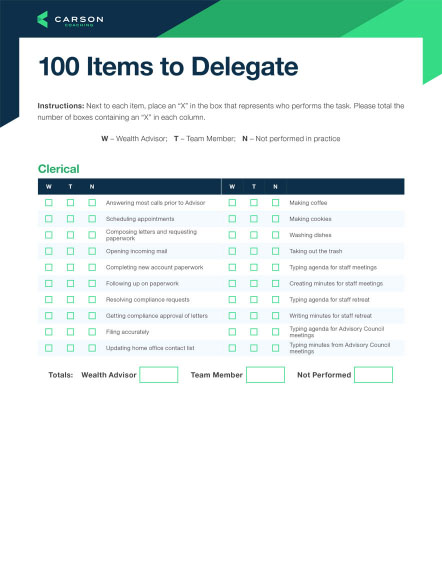Carson Wealth Managing Partner Paul West says: “I love working with small business owners. Why? Because I am one.”
It’s only natural as an advisor that you would want to work with others like you. And West notes that he likes working with small business owners for many reasons, the first being that they are businesspeople who aren’t afraid to invest in their business.
Financial Advisor, citing research from Nationwide, noted that advisors are critical in helping business owners not only navigate the financials of their business, but also in helping them navigate today’s uncertain economic environment.
And there’s incredible opportunity to do so, as there are around 33 million small businesses in the United States, according to Forbes, and only 35% of them work with a financial advisor, according to Financial Advisor. When it comes to mid-sized businesses, approximately 59% of them work with a financial advisor.
It’s an underserved market. It’s almost so obvious that most advisors miss it. But there is a caveat: Serving business owners takes time and expertise to become a valued provider.
Serving the business owner market just seems like putting a square peg in a square hole for advisors, yet for whatever reason, not many advisors are targeting them. Let’s get into why serving business owners is a natural fit and how you can go about doing it.
The Benefits of Serving Business Owners
West notes that there are many reasons he prefers working with business owners. First, he already knows so many of them, he understands them and he likes that they are comfortable writing checks.
They invest in their firms. When West tells them his minimum fee is $5,000 a month, or $60,000 a year, they don’t flinch. They’re used to making investments in their business. They’re not the do-it-yourselfers who push back on fees.
People like working with people who get them. Because you yourself are likely a business owner (owning your own firm), other business owners are probably going to be more comfortable working with you.
Edelman Financial Engines found that upward of 80% of people prefer to work with a professional who is of the same background as them. High-powered women like to work with high-powered women advisors. Firms like Kingdom Advisors like to work with practicing Christians. There is no exception for business owners. They like to work with other business owners because they’re wired the way you’re wired.
You’re in the same networks. You’re probably already networking with many business owners. Perhaps it’s your local country club or social club. Maybe you’re a member of the chamber of commerce. You’re probably already in community with them but haven’t prospected them yet. You’re basically on a lake with all these good fish, but you’re not fishing.
The Substance and the Sizzle
Many advisors might want to serve business owners but think, “I don’t have any expertise there.”
Author Daniel Pink notes in a MasterClass on sales and persuasion that when it comes to self-talk, you can incorporate what he calls introspective self-talk. Rather than saying, “I can do it,” or “I’ve got this,” ask yourself, “Can I do this?” Then lay out your game plan for how you can do whatever “this” may be.
One way to answer that question in the context of serving business owners is to build up your expertise and get relevant training to serve this niche. While your CFP designation provides an incredible amount of planning competency, there’s nothing in the training specific to business owners per se.
My colleague J.J. Peller, Executive Business Coach, said that learning to serve business owners is something you can decide to do. Paul West has the Certified Exit Planner (CExP) credential. You can get this one or the Certified Exit Planner Advisor (CEPA), which a few of our Carson Executive Business coaches have seen be helpful.
When you have your credentials to serve business owners, that’s a nice sizzle to add to your already stellar substance. And if you’re on a bigger team at a bigger firm, you only need one person to have that credential.
When you complete credentials specific to areas important to business owners—like exit planning—it communicates that you are so much more competent and it boosts your confidence, making it easier to close business.
The Long Game: Building Trust and Adding Value
My colleague, Executive Business Coach Tammy Breitenbach, grew up in a family that has a multigenerational business. Her grandparents and great uncle opened a filling station in Kansas that has since become a successful furniture store.
Breitenbach notes that you shouldn’t serve this niche for the money alone—you really have to have a passion for it and really understand business owners.
Forge connections and build trust. And more than just serving business owners to help them run their business, likely what you really want to do is networking with them and prospecting those people who are going to be exiting the business in the next five years or so. That’s when you can bring a planning engagement to the business owner and charge a fee of $50,000 annually for three to five years—or whatever fee is most appropriate given the firm and the complexity.
You’ll help the business owner with the normal planning, but also help them polish up the business to optimize and monetize it. You’ll help them polish up their P&L, KPIs and balance sheet and organizational chart so they can get the maximum value for their firm. You’ll also help them with any tax efficiencies that you can find for their exit.
But becoming the advisor who does all of those things takes time and work. You want to build relationships two, three and even five years before that business owner is planning to exit the business. If you’re trying to make a connection with somebody who is already selling their business, you’re too late.
Building trust and relationships over that runway prior to the owner selling the business takes time.
When you’re networking with business owners in the places where they already are (chamber of commerce, social clubs, etc.), Peller recommends building trust like you would with anybody else.
“Show them you genuinely care,” Peller said. “Ask questions. Be curious about their business and what they love about it. Offer value whenever possible.”
On the last point, Peller recommends offering them resources, sharing articles and ideas, and connecting them with other centers of influence who might be helpful to their business.
Become their advisor first, then throw your hat in to be their exit planner. Carson Executive Business Coach Jessica Colston notes that you can get an in by working as their trusted financial advisor for things like estate planning and tax planning. Breitenbach further adds that while you’re serving as their advisor, you must ensure they know you are also a trusted professional in things like business exit planning.
Help them figure out their next chapter. Take an exercise like the Blueprinting Guide and offer to help them get a sense of what their calling, purpose and legacy are. Walk them through it. Bring Blueprinting to them as a tool from a fellow human. Offer to have those discussions with them to help them figure out what they want to do with their business, why they’ve built their business and what they want for it in the future.
Selling a business is not the end, but it’s a starting point to a new beginning. You can help them figure out that new beginning and what will be in the next chapter.
The Final Word
I’m not an expert in serving business owners, but I know enough to know there’s a whole lot of money there and it’s an underserved market. But you do have to have the passion and the competency to work with business owners to be successful.
Back to Daniel Pink’s introspective self-talk: “Can I do this?”
Yes, you can. But you have to have the self-awareness to be able to say, “Do I really have the story and the value that I can bring to the equation?” You have to be comfortable swimming in these deep waters because some of these business owners are worth $50, $80 or $100 million. Not everybody is comfortable swimming in that pond.
Remember that sales is nothing more than a transfer of confidence. If you’re going to prospect and work with business owners, you need to have confidence. And that confidence comes with having the goods (both the substance and the sizzle), building relationships and providing value and having a great team behind you.
Now, go ahead and go fishing. And if you need somebody to help you, get in touch.


